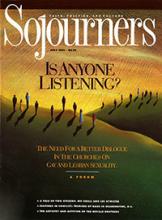The media succumbed to yet another case of Kennedy fascination this spring, due to charges that over Easter weekend William Kennedy Smith raped a woman at the family estate in Palm Beach, Florida. In the process, the news spotlight landed on a question that's been simmering in some circles for years. In the effort to achieve a society free of rape, and in the effort to free women from a blame-the-victim experience in prosecuting rapists, is there anything to be gained from publishing the name of the woman reporting the rape as well as that of the alleged rapist? And what's to be lost?
Unfortunately, other questions about rape have surfaced again as a result of this case, indicating that many people still think of rape primarily as a sexual crime and overlook the violence involved. Let's set the record straight: It just doesn't matter whether the woman knows the man or not, what she was wearing or looks like, or even how he or she conducts his or her life and relationships. If a man overpowers a woman and violates her sexually without her consent, he has committed a violent crime.
In raising consciousness about rape, it has been important to educate police, the courts, the media, and the general public that rape is violence and not sex. The media, which have a large part to play in perceptions created about the individuals involved in a rape, have in turn traditionally acknowledged the intimate nature of violation by rape -- a difference from other violent crimes -- by withholding the identity of the woman. This has helped to prevent the phenomenon of formerly private lives being transformed overnight into topics of public conversation, a protection that many rape survivors have said was critical to their healing.
Read the Full Article
